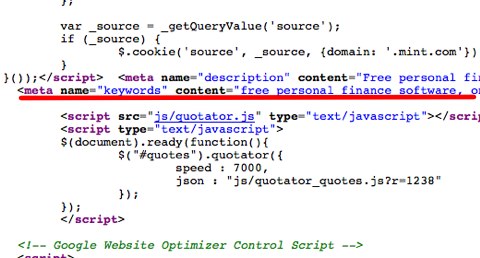Marketing your web-based business is never an easy thing to do. You’re bound to make a lot of mistakes and waste money on things that just don’t work.
Over the past 8 years, I have worked with dozens of startups. Many of these startups got acquired, but most of them failed. And one trend that I noticed between the successful startups and the failures, is that the failures made a lot of marketing mistakes.
Here are 7 marketing tactics that you should avoid with your business:
1. Useless splash pages

A common trend on the web is to create a splash page before you launch your startup. On this splash page you’re probably a bit vague on what your company is about and you have a message saying that you are launching soon.
The problem with creating a splash page like the one above is that it isn’t useful to the people visiting your site. If you create a minimalistic splash page like the one above, the chances that someone is going to come back to your website in 30 days is slim to none.
Here is how you can create an effective splash page:
- Grab people’s attention – you only have a few seconds to grab someone’s attention. A catchy headline that’s relevant to your business is a good start.
- Don’t be shy – tell people what your product or service is going to be before you have created it.
- Include visuals – if you have a screen shot of your product or service, include it. It doesn’t have to be perfect, it just has to visually explain what you are creating.
- Promise a solution – tell your ideal customer what you are going to do for them.
- Collect emails – at the end, you should collect people’s name and email address. This way, you can send them an email when you launch.
2. Links at the bottom of each page

Who doesn’t want to get ranked at the top of Google? Not only does search traffic convert well, but it also usually provides a high ROI. So what’s the best way to get ranked on the top of Google? Well, it’s isn’t by adding a ton of rich anchor text links at the bottom of every page of your site to other internal pages.
There are a few wrong things with the image above:
- Internal links do help increase rankings, but external links are much more effective.
- Internal links are typically more effective when they are placed within your content.
- Rich anchor text links are a great way to increase rankings, but once again it is more effective to have rich anchor text links coming from external sites.
3. Meta keywords tag

Wouldn’t it be nice if you can tell search engines what keyword they should rank you for? The most common way to do this is to create a meta keywords tag and enter in all the keywords you want to rank for.
The problem with meta keywords tags is that you would probably put every keyword you can think of in it, even if your site wasn’t 100% related to those keywords. For this reason search engines ignore them and they determine what keywords your website should rank for based on your content and the websites that link back to yours.
4. Blogging for Diggs

One of the most common trend startups are riding is that they are creating infographics, comic strips, and other viral related content on their blog. And by creating viral based content, their traffic typically sky rockets.
It’s a great idea, but only if the content is relevant. For example Mint.com does a great job of creating viral content that was related to finance. If they created viral content that wasn’t related to finance they could have probably still increased their traffic, but those visitors wouldn’t have signed up for their service.
So if you are going to create viral content, make sure it is related to your business. If you don’t, you won’t see an increase in your revenue, which at the end of the day is all that matters.
5. Creating unnecessary buzz

Doesn’t it sound like a cool idea to get covered by popular blogs like TechCrunch, Mashable, and ReadWriteWeb? If you have a tech related business, then yes it is cool. If you don’t, those blogs probably won’t drive that many customers.
For example, if you have a business that is targeting moms, you shouldn’t care if TechCrunch writes on you or not. Instead you should care if the top mom bloggers covers your business. You’ll get a lot more moms over to your website if a mom blogger writes on you versus TechCrunch, even though that mom blogger probably has 1000 times less readers than TechCrunch.
At the end of the day, don’t just get bloggers to write about you for press and traffic, get them to blog about you because your product or service solves a problem for their readers.
6. PR helps build brands, not revenue

When you are starting out it may seem like a great idea to hire a PR firm to get you into the New York Times and Wall Street Journal, but that won’t necessarily help you increase your bottom line.
I have been covered in over 20 major publications like the Wall Street Journal and although it helped with my company’s brand, it didn’t get us many customers. If we put more time into marketing efforts that had a direct ROI, we would have been better off.
Now if you are approached by a journalist, this doesn’t mean you shouldn’t talk to them. If you can use a New York Times logo on your website to increase your conversion rate, that’s great. Just don’t go crazy and spend a lot of time seeking a full-page story in the New York Times. If it comes to you, great… but don’t chase it.
7. Bribing customers isn’t smart

Contests, prizes, and gifts are a great way to get potential customers coming to your website. But if you have a good product or service why should you have to stoop to that level?
Your product or service is great, so customers should gladly want to use your product. If you keep on giving stuff away for free, people will just continue to expect it. And more importantly you’ll find yourself gaining customers who are using your product or service for the wrong reason.
Although throwing contests may seem tempting, use it as a last resort. You’re better off spending that time and energy into building a better product or service.
Conclusion
There are tons of ways you can market your startup. But the worst ways are usually the easiest ones. Before you start marketing your business online, really think about what’s best for your business and customers.
There is no reason to rush things, as it will just cost you time and money. Plan things out and if you happen to make mistakes, learn from them and adapt quickly.
Source: Quicksprout.com






